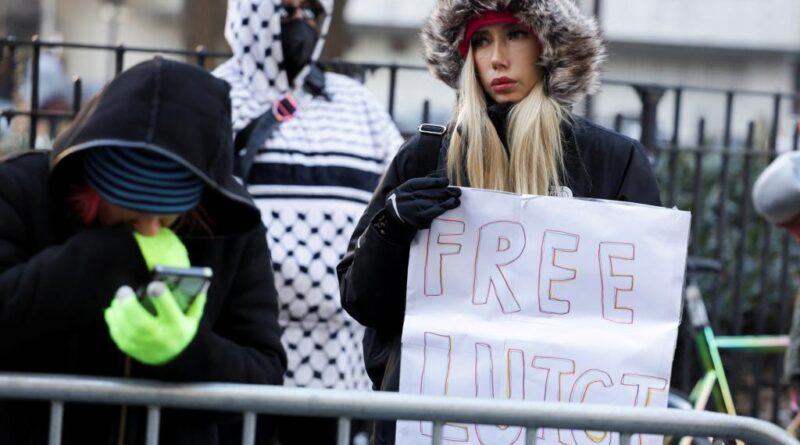Feminists Who Criticized Masculinity Now Celebrate Luigi Mangione

Progressive women seem to be throwing themselves at alleged United Healthcare CEO killer Luigi Mangione, caught up in a wave of sexual frenzy that has taken over social media, a phenomenon that can be linked to years of criticizing masculinity.
After Mangione’s arrest at a Pennsylvania McDonald’s in December, he quickly transformed into a leftist icon, being referred to as a “more attractive Jesus” and “too handsome for the death penalty,” amidst other provocative discussions. His Brooklyn jail address has also gone viral.
When he pleaded not guilty to first-degree murder charges in court this past Monday, the public seating was filled almost entirely with young women reportedly there to show support for the 26-year-old. Moreover, many gathered outside with signs bearing the message “Free Luigi.”
It’s true that historically some women have expressed attraction toward infamous killers like Ted Bundy and Richard Ramirez. However, the magnitude and fervor surrounding the Mangione phenomenon is unmatched.
This attraction stems from a mass sexual frustration that has been building for some time.
Years of focusing on toxic masculinity, criticizing men and sidelining traditional chivalry have led some women on the left to latch onto Mangione, as he embodies a type of masculinity they’re finally willing to embrace — one that carries political acceptability.
While cold-blooded murder exemplifies the most extreme form of “toxic” masculinity… it seems to be less condemned if it’s supposedly committed in the name of anti-corporate and anti-capitalist sentiment.
While it’s undeniably hypocritical, it makes psychological sense.
A generation of young women has been encouraged to criticize men and suppress their inherent need for a male-female dynamic in their lives.
Enter Luigi, the embodiment of masculinity, both in looks and actions: a heteronormative frat boy with a strong jawline who allegedly committed a shocking murder in a brazen manner.
He’s irresistible for repressed, anti-capitalist individuals who can hide behind their criticisms of the insurance industry — and behind their Covid-era masks, should one try to identify his courtroom admirers.
If leftist women view themselves as damsels in distress trapped by the insurance industry and the expensive healthcare system, Mangione represents their heroic knight: battling on their behalf, vanquishing the adversary, and taking a stand for their issues.
This sense of feminine frustration has even emerged in the form of “Deny, Defend, Depose” panties, the phrase Mangione allegedly wrote on the bullets he used to coldly murder Brian Thompson. Anti-capitalists are purchasing these for $35 a pair to symbolize their rebellion against the system.
Fans of Mangione can also acquire a cropped tee featuring his image surrounded by a heart with the text “but daddy I love him” — a nod to Taylor Swift — printed in bright pink.
This all illustrates a primal yearning for a masculine influence, creating a sexual fantasy so convoluted that these women seem to forget that their slain ‘enemy’ was not some mythical creature, but a father with two sons.
Having condemned healthy masculinity among the men around them, extreme feminists may now grasp at an exaggerated version of gallantry in the person of Mangione. When proper expressions of masculinity and femininity are repressed, unhealthy extremes become revered.
This is not merely a hypothesis.
While young women today champion progressive gender dynamics publicly, a starkly different narrative is unfolding in private.
In their private lives, many are requesting that their sexual partners choke them during intimacy. Notably, two-thirds of college women — likely the most progressive demographic available — report having experienced choking during intercourse.
These young women assert their equality with men in day-to-day life yet appear to be aroused by relinquishing personal power to their sexual partners—a dynamic that could prove fatal.
When women are led to view simple gestures, like holding a door or offering a seat on the subway, as misogynistic acts, their repressed need for natural gender roles finds expression in other ways.
Clearly, third-wave feminism has generated a distorted view of masculinity among women: regarded as something to be criticized in healthy forms, yet fetishized in its harmful extremes.
Young women have been conditioned to renounce their instincts by belittling their partners and denying their own essential desire for a balance of male and female energy. After effectively chasing masculinity out of their lives, they now find themselves longing for it, even if it’s subconsciously.
Enter a striking alleged murderer whose motives align with their beliefs, and you create a sexual phenomenon unlike any other.
In an era where masculinity is labeled toxic, the thrill of vigilantism has become fetishized.



